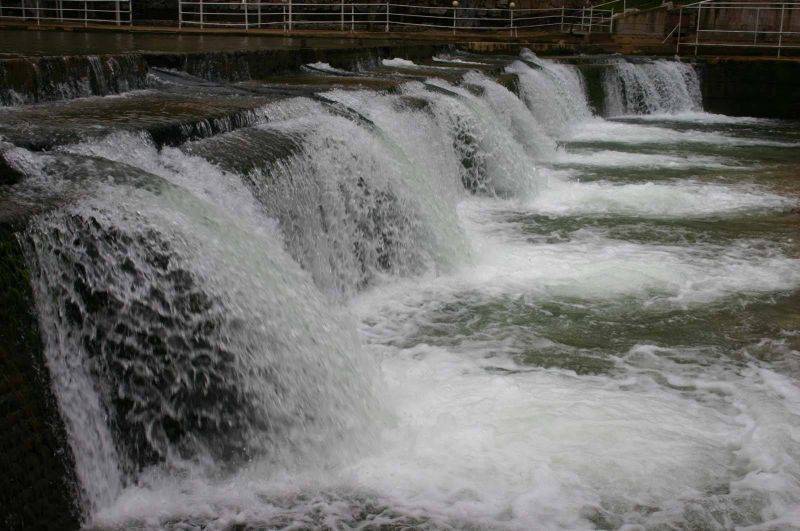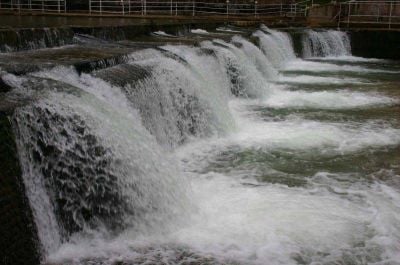
Pumps propel water into reservoirs on the Hasbani River in southern Lebanon. Credit: Saïd Maalaoui)
UNICEF’s representative in Lebanon, Yukie Mokuo, caused a media storm in the country on July 23 when she declared in a statement that most water pumping will gradually cease across the country in the next four to six weeks due to the rapidly escalating economic crisis and shortages of funding, fuel and supplies, such as chlorine and spare parts. She stated that a minimum of $40 million per year is needed to allow the water establishments to continue operating. This news comes as a further blow to the crisis-hit country and adds to citizens’ list of life-threatening issues. Lebanon is facing a confluence of crises that is a reflection of decadeslong mismanagement of the country by successive governments. There is no more telling an example of this convergence than what is happening in the water sector. The linkage between water and energy has been well established scientifically and technically, and the residents of Lebanon are well aware of it: when there is a power outage, pumps do not work and water does not get pumped into their buildings’ reservoirs, hence their reliance on private generators in part for pumping water to reservoirs.
At the national level, electricity plays a major role in making water available to households. Electricity is needed to pump water from the source to the water treatment facility, for the water treatment process and for pumping to storage facilities. Electricity is also needed for wastewater treatment. According to a recent study by the American University of Beirut’s Issam Fares Institute for Public Policy and International Affairs (AUB-IFI), the lack of electricity to power wastewater treatment facilities is a major reason why many of these facilities are not operational in Lebanon. Untreated wastewater, thus, gets discharged into rivers and groundwater, contaminating them and making them expensive to access and use.
The same study by AUB-IFI has shown that electricity accounts for more than a third of the operational costs of all four water establishments responsible for managing Lebanon’s water resources. These water establishments are unable to cover their operational expenses due to the low tariff levied. The near continuous power outages in many regions of the country have has forced the water establishments in some locations to rely on private diesel-powered generators to supply electricity to their facilities. This option has failed to solve the problem since Lebanon is also facing a fuel crisis, which limits access to diesel for power generators. This situation has led water establishments over the past week to inform their customers that the water establishments would be unable to deliver water.
The problem is further compounded by the free fall of the Lebanese lira versus the US dollar. The water establishments’ revenue from subscriptions is in Lebanese lira and so is whatever support they get from the government. This has negatively impacted the ability of the water establishments to maintain their facilities. They cannot afford to purchase spare parts and consumables for their water treatment facilities and their laboratories for testing the quality of water they provide. The few operational wastewater treatment facilities are similarly affected. Additionally, contractors preferred to cut their losses and pay the penalty (in Lebanese lira) for breaking their contracts with the water establishments rather than continue being paid in Lebanese lira for their work. This has impacted the ability of some water establishments to maintain their networks and/or execute rehabilitation projects for some facilities.
It is obvious that the government is financially unable to support the water establishments in securing funds to purchase diesel and to pay for their other financial needs; fortunately, the donor community, led by the UNICEF, USAID, AFD, the EU and others, has stepped in. Many donors have stressed the point that they do not want the water sector in Lebanon to collapse, given that they have previously witnessed this exact situation in Iraq where the cost of reviving the water sector cost significantly more than it would have cost them to maintain its operationality. Such support though, should not be totally geared towards the purchase of diesel, consumables, spare parts etc.; instead, it should be structured in a manner to ensure the resilience of the sector against similar shocks in the future and ensure its sustainability. One important investment by the donor community would be in the conversion to renewable energy of as many water sector facilities as possible. Any investment now in renewable energy would reduce future donors’ expenditures and help Lebanon’s water sector move away from reliance on fossil fuels. The AUB-IFI study, funded by the European Union, identified many water and wastewater facilities that are ready for such conversion. It indicated that one of the major costs involved in the shift to renewable energy is that of storage of power; however, this is decreasing and in the very near future is expected to become affordable. Donor support over this period would be more effective and long lasting than supporting diesel purchases.
Thus, the donor community is strongly urged to continue supporting Lebanon’s water establishments in their efforts to maintain the supply water to the country’s residents; however, the donor community is equally strongly urged to include in this support the establishment of renewable energy facilities on land owned by the water establishments and municipalities to power the water sector.
Nadim Farajalla is the director of the climate change and the environment program at the Issam Fares Institute for Public Policy and International Affairs at the American University of Beirut.
